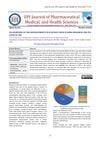 89 citations,
November 2014 in “International Journal of Nanomedicine”
89 citations,
November 2014 in “International Journal of Nanomedicine” Using nanostructured lipid carriers to deliver spironolactone could improve treatment for hair loss.
[object Object]  57 citations,
September 2017 in “Journal of controlled release”
57 citations,
September 2017 in “Journal of controlled release” Nanocarrier-loaded gels improve drug delivery for cancer, skin conditions, and hair loss.
 42 citations,
January 2021 in “Journal of Clinical Medicine”
42 citations,
January 2021 in “Journal of Clinical Medicine” Microneedle arrays with nanotechnology show promise for painless drug delivery through the skin but need more research on safety and effectiveness.
 39 citations,
September 2016 in “Expert Opinion on Drug Delivery”
39 citations,
September 2016 in “Expert Opinion on Drug Delivery” New drug delivery methods can make natural compounds more effective and stable.
 38 citations,
July 2021 in “ACS Nano”
38 citations,
July 2021 in “ACS Nano” Microneedles help treat hair loss by improving hair surroundings and promoting growth.
 36 citations,
September 2019 in “Journal of Herbal Medicine”
36 citations,
September 2019 in “Journal of Herbal Medicine” Herbal nano-formulations show potential for effective skin delivery but need more research.
 33 citations,
October 2016 in “European Journal of Pharmaceutical Sciences”
33 citations,
October 2016 in “European Journal of Pharmaceutical Sciences” Effervescent formulations may improve minoxidil delivery, increasing effectiveness and reducing applications needed.
 30 citations,
June 2016 in “European Journal of Pharmaceutical Sciences”
30 citations,
June 2016 in “European Journal of Pharmaceutical Sciences” Optimized film improves finasteride skin absorption and treatment efficiency.
 19 citations,
September 2020 in “Pharmaceutics”
19 citations,
September 2020 in “Pharmaceutics” Sodium Valproate nanospanlastics could be a safe and effective treatment for Androgenic Alopecia, with fewer side effects than minoxidil.
 18 citations,
March 2014 in “Drug Development and Industrial Pharmacy”
18 citations,
March 2014 in “Drug Development and Industrial Pharmacy” New gel formulas without ethanol and propylene glycol, containing a minoxidil-methyl-β-cyclodextrin complex, have been created for treating hair loss.
 18 citations,
May 2020 in “Biomolecules”
18 citations,
May 2020 in “Biomolecules” Spironolactone, a heart and liver drug, has new uses including cancer treatment, viral infection prevention, and skin condition improvement.
 8 citations,
July 2011 in “Critical reviews in analytical chemistry”
8 citations,
July 2011 in “Critical reviews in analytical chemistry” The document concludes that validated methods are needed to ensure the quality of fluconazole drugs and that new antifungal medications are necessary due to safety and resistance concerns.
 4 citations,
January 2022 in “Current pharmaceutical design”
4 citations,
January 2022 in “Current pharmaceutical design” Microsponges delivery system is a safe, versatile method for controlled drug release in various treatments.
 August 2024 in “UPI Journal of Pharmaceutical Medical and Health Sciences”
August 2024 in “UPI Journal of Pharmaceutical Medical and Health Sciences” PRP shows promise in musculoskeletal rehabilitation but needs standardized reporting for better outcomes.
 April 2024 in “International journal of clinical trials”
April 2024 in “International journal of clinical trials” SesZen-Bio™ improves hair density, thickness, and overall hair health.
 January 2024 in “Regenerative Biomaterials”
January 2024 in “Regenerative Biomaterials” Dissolvable microneedles with Ginsenoside Rg3 can help treat hair loss by improving drug delivery and stimulating hair growth.
 January 2015 in “Elsevier eBooks”
January 2015 in “Elsevier eBooks” Nanocarriers like liposomes and cyclodextrins improve how angiotensin-(1-7) is delivered in the body.
 April 2024 in “AAPS PharmSciTech”
April 2024 in “AAPS PharmSciTech” New microneedle method improves hair regrowth treatment delivery.
 2 citations,
August 2023 in “Pharmaceutics”
2 citations,
August 2023 in “Pharmaceutics” New skin disease treatments using TDDS are improving but face challenges like side effects and high costs.
2 citations,
July 2022 in “BioMed Research International” Finasteride-loaded nanogels are effective, safe, and improve drug absorption through the skin.
 December 2024 in “Pharmaceutics”
December 2024 in “Pharmaceutics” Spironolactone nano-formulations show promise for treating skin disorders, but more research is needed for safety and effectiveness.
 96 citations,
September 2021 in “International Journal of Molecular Sciences”
96 citations,
September 2021 in “International Journal of Molecular Sciences” Chitosan, a natural substance, can be used to create tiny particles that effectively deliver various types of drugs, but more work is needed to improve stability and control of drug release.
64 citations,
October 2017 in “Colloids and surfaces. B, Biointerfaces” Chitosan-coated nanoparticles can effectively deliver positively charged drugs through the skin using iontophoresis.
60 citations,
October 2020 in “Journal of Controlled Release” Curcumin nanocrystals in simple gels effectively penetrate hair follicles, but humectants can reduce this efficacy.
54 citations,
June 2020 in “Pharmaceutics” New nanocarriers improve drug delivery for disease treatment.
 33 citations,
July 2021 in “Clinical, Cosmetic and Investigational Dermatology”
33 citations,
July 2021 in “Clinical, Cosmetic and Investigational Dermatology” Nanocarrier technology in cosmetics improves ingredient delivery and effectiveness while reducing side effects.
 16 citations,
October 2023 in “Molecular cancer”
16 citations,
October 2023 in “Molecular cancer” New treatments like nanotechnology show promise in improving skin cancer therapy.
13 citations,
November 2022 in “Biomaterials Science” The microneedle patch effectively promotes hair regrowth by delivering miR-218.
[object Object]  12 citations,
September 2022 in “Foods”
12 citations,
September 2022 in “Foods” Some nutraceuticals may help in COVID-19 prevention and treatment, but more research is needed.
 12 citations,
February 2022 in “Acta Biomaterialia”
12 citations,
February 2022 in “Acta Biomaterialia” Minoxidil-loaded hyaluronic acid microneedles can effectively increase hair growth and could be a promising treatment for hair loss.

























